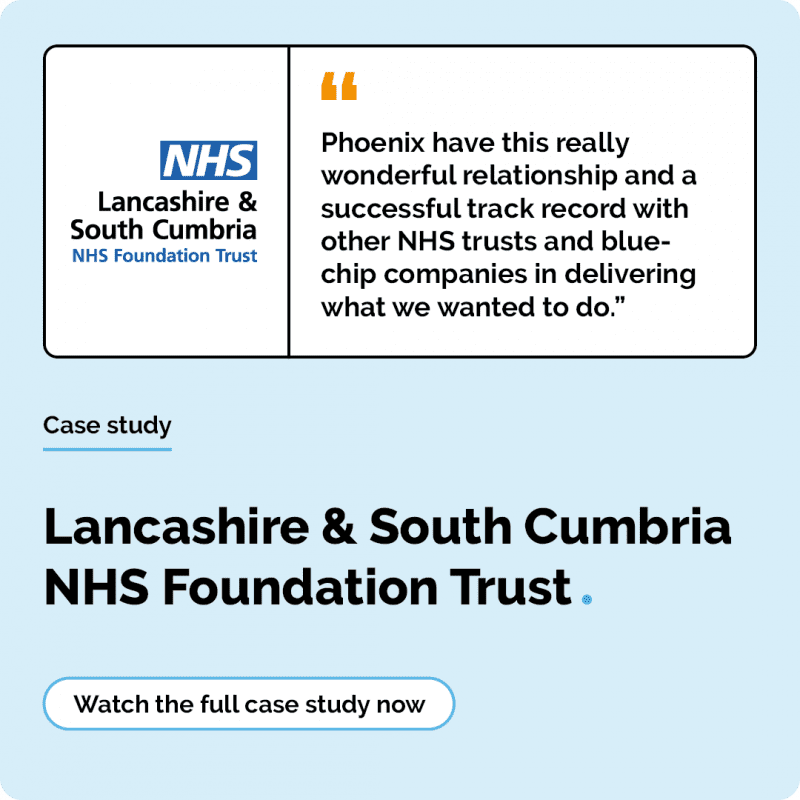As the UK’s largest employer and one of the largest organisations in the country, the NHS has a massive impact on our environment and is responsible for a significant proportion of the UK’s carbon emissions and electricity consumption.
In 2020, the NHS committed to achieving net-zero by 2040 for the emissions it controls directly, and net-zero by 2045 for the emissions it can influence. This is a huge target set by the NHS and one that’s ten years ahead of the UK government’s targets. For the NHS to achieve these goals, it must devise an effective sustainability plan focusing on reducing its energy consumption.

While these are all proven to be successful sustainability methods, to reduce your emissions considerably, you should be considering how your technology and IT infrastructure supports your overall sustainability strategy. Despite NHS Digital introducing a ‘cloud-first policy’ for all of its trusts, many are still yet to fully commit to the cloud and make the most of the transformational, security, and sustainability benefits it provides.
How are cloud solutions reducing energy consumption?
With energy consumption being a primary contributor to the NHS’s environmental impact, it’s key for you to find new and innovative ways to reduce this. Adopting a cloud infrastructure is one way in which large-scale organisations are choosing to reduce their electricity consumption. By moving away from on-premises systems, they’re taking away the environmental and financial cost that comes with physical infrastructure.
Here are just four of the sustainability benefits of moving to the cloud:
By moving your IT systems to the cloud, you’ll reduce your need for on-premises hardware, which consumes large amounts of energy.
Alongside removing the energy used by on-premises solutions, cloud service providers often use energy-efficient technologies to power their data centres.
Cloud solutions allow you to scale your IT resources up or down based on your demand. This means you’ll be able to avoid over-provisioning IT resources and wasting energy on unused capacity.
Cloud solutions reduce the need for hardware maintenance, which can consume a lot of energy.




By utilising a cloud solution, your hospitals and practices will be removing a huge amount of energy used up by on-premises systems. According to Microsoft, customers who have migrated from on-premises databases to Microsoft Cloud have observed a significant increase in carbon and energy efficiency, with improvements of up to 98% and 93% respectively.
Cloud infrastructure refers to the IT services and resources that are hosted and managed by a third-party provider, while on-premises refers to IT resources that are physically located with an organisation’s own premises and managed in-house.
Some of the benefits of utilising a cloud infrastructure over on-premises in healthcare include:
- Greater scalability: enables healthcare providers to quickly and easily adjust their computing resources to meet changing demands, without having to invest in new hardware
- Promotes remote/ hybrid working: allows your doctors and consultants to access their data and applications from anywhere with internet connection, offering greater patient convenience and reduced travel
- Reduced burden on in-house team: the cloud providers are responsible for maintaining the infrastructure and ensuring high levels of security and availability

The Microsoft Cloud provides healthcare organisations with sustainable technologies that enable them to optimise their operations and reduce carbon emissions. By leveraging cloud-based solutions, healthcare providers are streamlining workflows, improving data management, and enabling remote patient care, all of which assist in reducing the industry’s environmental impact. Additionally, Microsoft’s commitment to carbon neutrality means that using its services will contribute to the UK healthcare sector’s goals of becoming more sustainable.
Book a chat with our Microsoft Specialists
Dell’s cloud solutions provide the healthcare sector with a highly secure and flexible IT infrastructure that is tailored to their specific needs. By moving their data and applications to the cloud, healthcare organisations reduce their reliance on on-premises hardware, lower energy consumption, and reduce carbon emissions. Additionally, it supports remote work and virtual care, which helps to reduce patient transportation and other related emissions.
Chat with our Dell Specialists now
Our strategic healthcare partners


Technology’s role in creating sustainability in healthcare FAQs
Sustainability is crucial in healthcare to ensure long-term viability and effectiveness of healthcare systems. Sustainable practices reduce environmental impact, lower operational costs, and improve public health outcomes by promoting healthier environments. By prioritising sustainability, healthcare providers can enhance resource efficiency, reduce waste, and mitigate the effects of climate change, which directly impacts health.
There are several IT solutions available to improve sustainability in healthcare, enhancing both environmental and operational efficiency.
Electronic Health Records (EHRs) reduce paper usage and streamline patient data management. Telemedicine platforms decrease the need for travel, reducing carbon emissions. Energy-efficient data centres and cloud computing optimise resource use while lowering energy consumption. Additionally, predictive analytics and AI can improve resource allocation, minimising waste in supply chains and clinical operations.
Integrated Care Systems (ICSs) are helping to improve sustainability in healthcare by fostering collaboration and resource sharing among healthcare providers, which enhances efficiency and reduces waste. By coordinating care across different sectors, ICSs streamline operations, reducing redundancies and optimising the use of medical supplies and facilities.
This integrated approach promotes preventive care and early intervention, which can lower the overall demand for resource-intensive treatments. Additionally, ICSs support the implementation of sustainable practices, such as energy-efficient technologies and telehealth services, further minimising the environmental impact of healthcare delivery.





